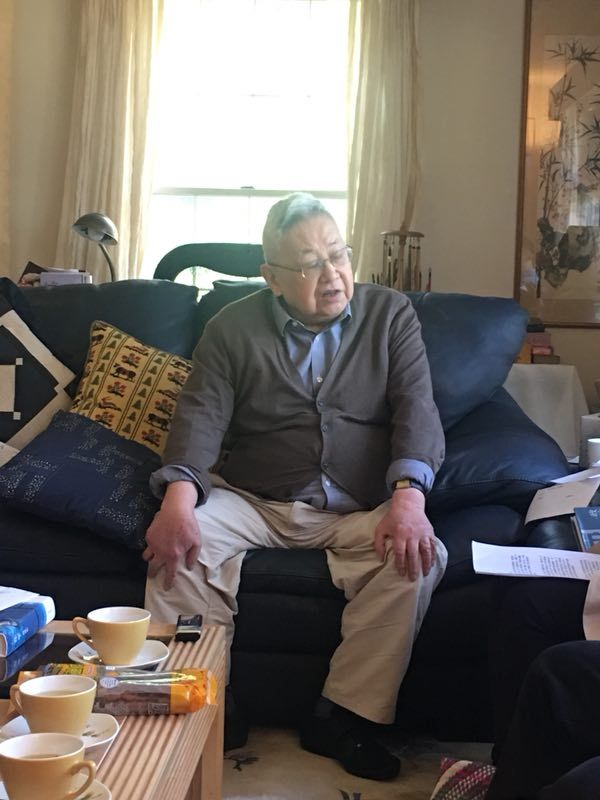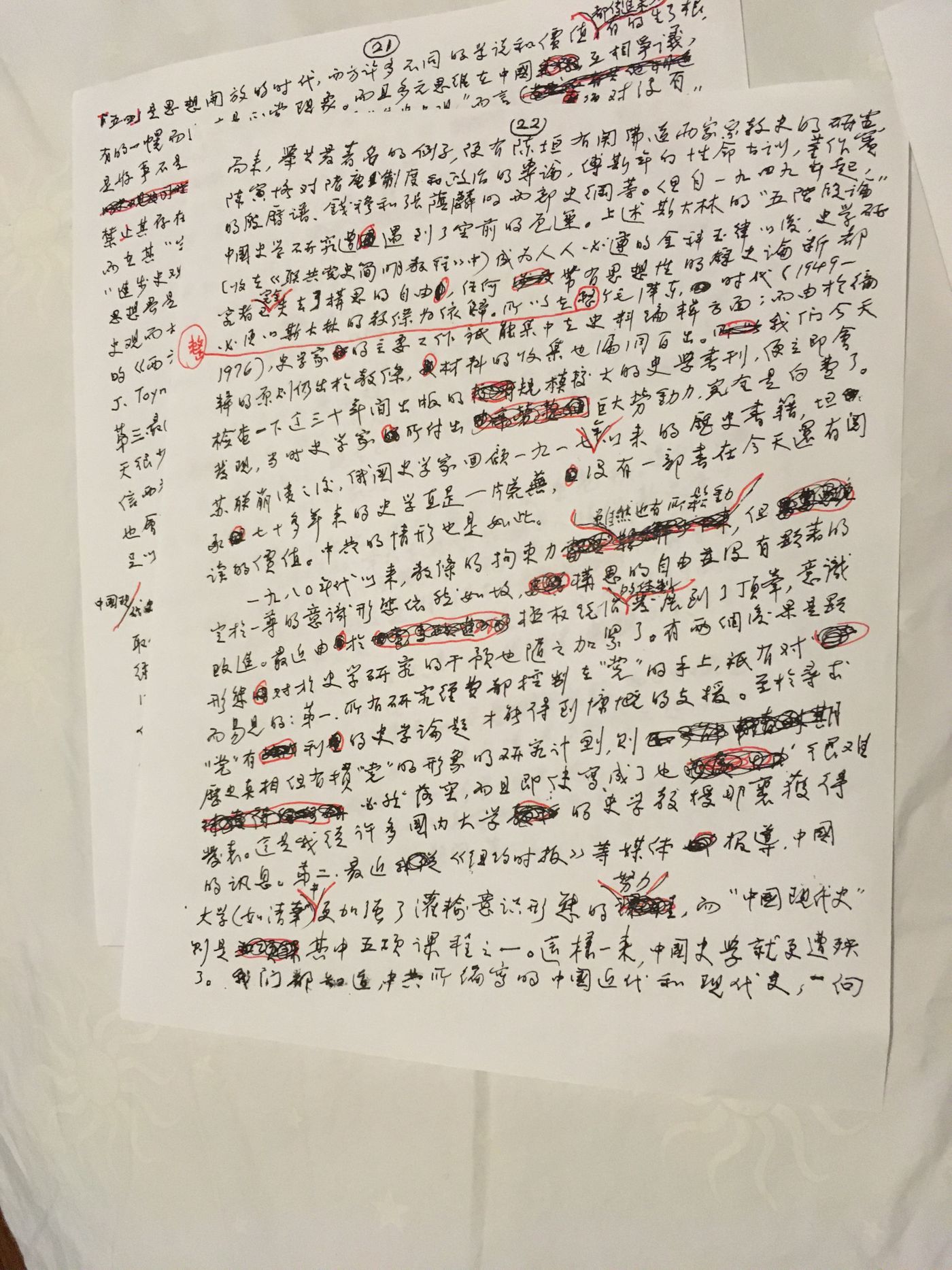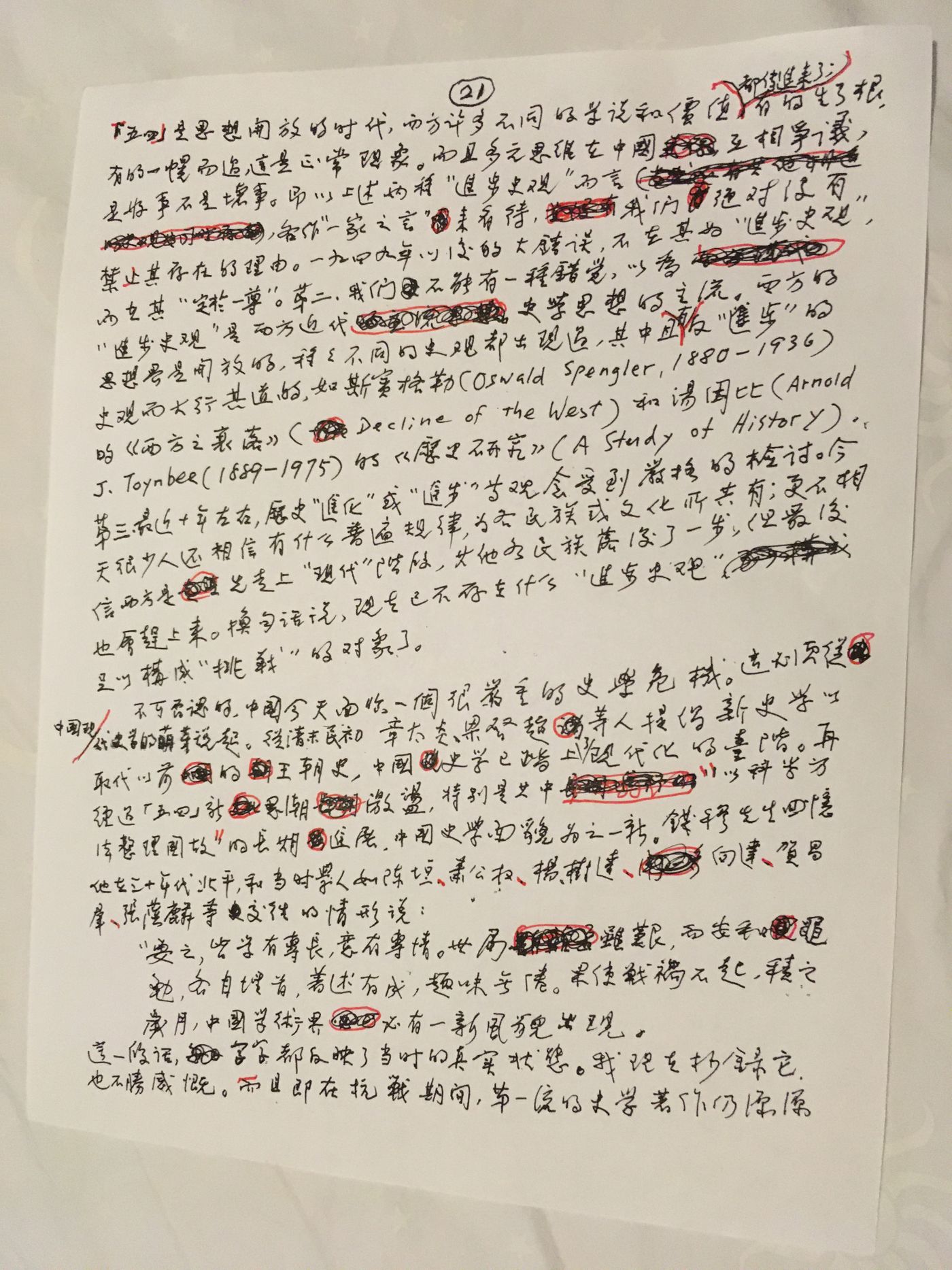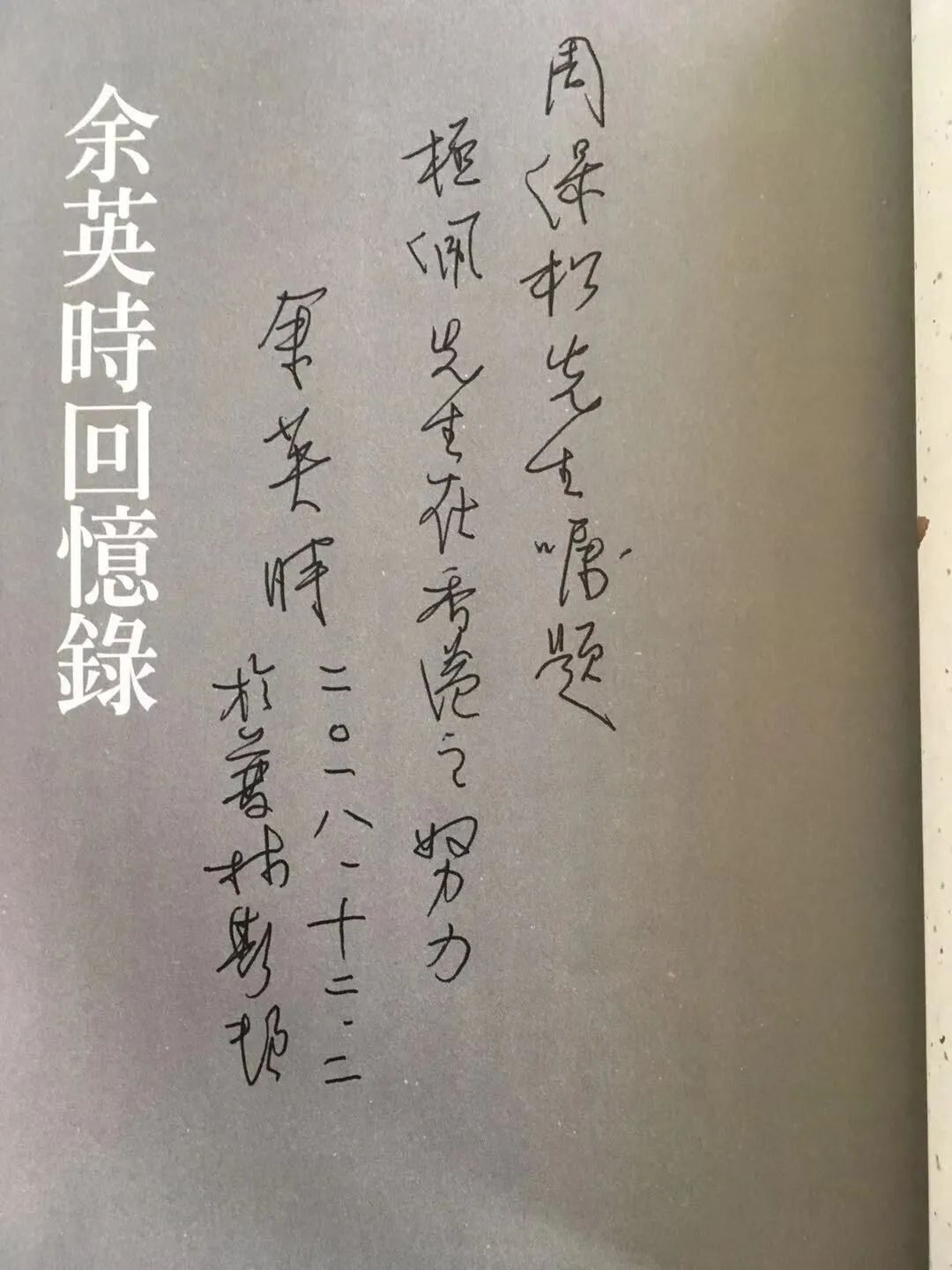Interview with Yu Yingshi
Journalists all know that the most difficult thing is not writing articles, not choosing topics, not things that readers can see, but things that readers cannot see, that is, the interviewee. Whether they accept to be interviewed, whether they are willing to talk, and how much they can tell you are actually the key to the success or failure of an article.
In August 2018, after the two interviews with Yu Yingshi I wrote for the book review section of the Economic Observer, "Interview with Yu Yingshi: The Establishment of a "Model" of Modern Chinese Academics" and "Yu Yingshi: No Regime Can Rely on Violence for a Long Time" written by Initium Media, came out, many friends and teachers praised me for my good writing, including many historians. But I must admit that these two interviews were really the result of Mr. Yu's special treatment of me, which made me feel ashamed. Because in the process of interviewing Mr. Yu, I made many mistakes that journalists should not make, and even seemed particularly stupid. However, Mr. Yu gave me unprecedented help, far beyond what an interviewee could do.
Many scholars wish to interview Mr. Yu Yingshi or visit him. As a junior scholar and a freelance writer focusing on culture, I have had this wish almost since I arrived in Boston, but I have always been waiting for an opportunity.
But several years passed and there was no opportunity.
I tried to get someone to introduce me and asked around, but the news I got back was that Mr. Yu is now in seclusion and won't accept interviews.
After Mr. Liu Xiaolei of Southern Weekend learned of my wish, he gave me Mr. Yu's contact information. So I kept calling, faxing, and writing emails, and prepared more than 20 interview questions, but I still couldn't contact Mr. Yu.
So, I decided to write a letter to Mr. Yu, using the old-fashioned way. I wrote down my wish to interview him and sent him more than 20 questions along with the letter, hoping that Mr. Yu would accept my interview and leave my mobile phone number in the letter.
After I mailed the letter, I didn't hold out hope. I felt that I was well prepared for the interview and couldn't give up easily. It wouldn't matter if I mailed a letter, at most I would lose a stamp. But what if Mr. Yu received the letter?
Unexpectedly, within two or three days, my cell phone suddenly rang. I clearly remember that it was a Saturday. A good friend of mine in Boston bought a house and renovated it. After a party at her house, I had a great time and almost forgot about the interview. At that time, the phone rang. I saw that it was a call from New Jersey. I hesitated for a long time before answering it. Because there are too many harassing calls in the United States, I don’t actually answer numbers I don’t recognize. But I didn’t know why I answered the phone that day, and a loud voice said on the other end of the phone: "I am Yu Yingshi, are you Luo Siyu?"
For at least a second, I felt like the world stopped turning. I quickly replied, "Yes, yes, I am."
On the other end of the phone, Mr. Yu spoke directly and straightforwardly, saying: "I can accept your interview, please come."
I calculated the time and found that Mr. Yu called me and asked me to come over almost as soon as he received my letter.
The interview was scheduled for 3pm on a Saturday in April, and I needed to rush to Princeton from Boston early in the morning. My friend rented a car to take me there, but because the journey was a bit far, we didn’t calculate the time well, and we were a full hour late. I called Mr. Yu’s house on the way, but I couldn’t get through. It would be the same if I went there. I found Mr. Yu’s house with trepidation, and found that Mr. Yu’s door was ajar. When I entered the door, I quickly apologized for being late. Unexpectedly, Mr. Yu and his wife apologized to me instead, saying that the phone line was damaged by the heavy snow, and they thought I would not be able to get through on the phone. So they specially left the door open to let us know that they had been waiting for us and it was okay to be late.
When you walk in and sit down, you will find tea and homemade snacks prepared on the coffee table according to the number of people.
Actually, my personality is not suitable for being a journalist, because I am a very reserved person who is not good at talking. In order to interview Yu Yingshi, I read almost all of Yu Yingshi's works published in mainland China, and even found a few master's and doctoral dissertations to read. At that time, Tian Yuan, the editor of the book review section of "Economic Observer", and I had a small ambition to try to interview overseas academics such as Yu Yingshi, Lin Yusheng, and Kong Feili. Yu Yingshi was the most important person in our interview plan at that time, so I tried very hard to read Mr. Yu's books. However, Mr. Yu's knowledge is like what Yu Ge said: "It is like a pond of ten thousand acres, which is not clear when it is clear, and is not turbid when it is disturbed." I was very clear whether I could talk with Mr. Yu. My knowledge level was completely inadequate, although I spent several months carefully preparing an outline.
But after meeting, I found that my worries were unnecessary. Mr. Yu is a very talkative person, not only in terms of his knowledge, but also in terms of his understanding of human nature. He seemed to be able to see through me and know my level. So, during the conversation, Mr. Yu seemed to take care of my knowledge. At the same time, he took care of my work as a reporter and patiently answered the questions I prepared like a student answering a teacher's questions.

Therefore, the interview was basically conducted according to my pre-planned outline. However, I found that no matter what Mr. Yu said, whether it was academic or about China or the United States, he would soon return to the CCP regime and the nature of the Communist Party. At that time, Mr. Yu happened to be writing his memoirs, and he was writing about the time when he left China in 1950. Mr. Yu talked about his views on the CCP in his youth. A few months later, his memoirs were published, and many things were recorded in the memoirs.
The original time was one hour, but Mr. Yu spoke for almost two hours. After the interview, I sorted out the text based on the recording, which was about 30,000 words, divided into two articles. Because just before I went to the interview, Zhang Jieping, the editor-in-chief of Initium Media, learned that I was going to interview Mr. Yu Yingshi and wanted to go with me, but she suddenly had something to do and couldn't come, so she asked me to write another article for Initium Media. So I wrote the interview into two articles, one about the academic part and one about the current affairs part, and then sent them to Mr. Yu.
Unexpectedly, Mr. Yu did not reply one month after sending it. I was a little worried that it might be lost. I was about to print another copy and send it to him when I suddenly received a call from Mr. Yu. Mr. Yu said loudly on the phone: I have sent the manuscript back, please pay attention to it.
When I got home, I saw the express delivery. I was shocked when I opened it. It turned out that, except for keeping the introduction at the beginning, Mr. Yu rewrote the manuscript by hand, on A4 paper, one article with 23 pages, another with 21 pages, a total of 44 pages. After handwriting, he revised it with a red pen. When I typed it in, I found that it was nearly 50,000 words. He told me on the phone that I answered your questions. His tone was like a student completing the homework assigned by the teacher, very seriously.


After I had typed all the manuscripts, I sent them to Mr. Yu again. The editor even polished the beginning of one of the manuscripts. Mr. Yu checked it again, picked out two typos, and praised the editor for his good polishing.
After several rounds of negotiation, the manuscript was finally finalized, which took about three months.
In August, these two interviews were published in the Economic Observer and Initium Media respectively. The one in the domestic Economic Observer had a great impact, because it was the first time that Mr. Yu Yingshi appeared in the media after he was banned in 2014, and it was a long interview of more than 10,000 words, covering an entire large page.
Editor Tian Yuan specially sent me two newspapers, and I really hope that Mr. Yu Yingshi can see these newspapers, not only because of the interview, but also because I think it is of great significance not only in academic terms for Mr. Yu to make his voice heard again in China.
So I wrote to Mr. Yu and said I wanted to send him a newspaper. Professor Yang Bin of the University of Macau happened to be in New York for a meeting, so I had the opportunity to visit Yu Yingshi for the second time. I told Mr. Yu that I would bring a few friends to visit him, and Mr. Yu agreed immediately. So, I went to Mr. Yu's house for the second time with Professor Yang Bin, Mr. Cheng Yizhong, Ms. Chen Junying, my senior brother Lin Wei, and a good friend Zhang Hai. Mr. Yu and his wife still carefully prepared tea and snacks according to the number of people, and remembered the names of the visitors in advance, and then asked them one by one.
It happened that Yu Yingshi's memoirs were published in Taiwan at that time, and were only available in Taiwan and Hong Kong. Mr. Yang Bin specially bought more than 20 copies of Yu Yingshi's memoirs from Hong Kong for everyone, carried them to New York, and then brought them to Princeton, asking for signatures.
Because in the two interviews, Mr. Yu talked about Hong Kong many times and was very worried about Hong Kong. During the first interview, he brought greetings from Mr. Zhou Baosong and asked Mr. Yu on behalf of Mr. Zhou Baosong: Would you like to go back to Hong Kong and New Asia College? Mr. Yu said no, and his determination was just like his refusal to return to the mainland after the June 4th Massacre in 1989. However, Mr. Yu admired the courage of Hong Kong people very much and praised Mr. Zhou Baosong.
When we met for the second time, I asked Mr. Yu to sign a book for Mr. Zhou Baosong. When he signed other people's books, Mr. Yu just signed them. But when I said that I wanted to give this book to Mr. Zhou Baosong, Mr. Yu paused and said that he wanted to write more. So he wrote on the book for Mr. Zhou Baosong: I admire Mr. Zhou's efforts in Hong Kong very much.

After that, Mr. Yu heard from somewhere that I was ill, and he and his wife asked about my condition with great concern. But I felt extremely ashamed and did not want to disturb their lives too much, because Mr. Yu said he was in seclusion, but in fact many people came to see him. And Mr. Yu was gentle and kind, and he did not seem to know how to refuse.
Since then, I have always wanted to send Mr. Yu a thank-you card. I also thought about sending a Christmas card to express my gratitude during Christmas, but I have always been too lazy.
Not long after, my friend Dongfang passed by Boston and told me that he had made an appointment with Mr. Yu to visit him. I quickly asked him to take a small book of mine, "The Source of My Freedom", to Mr. Yu to express my gratitude. In fact, I had always wanted to send the interview record to Mr. Yu after it was published, because his handwritten interview was the most important part of the interview record, and most of the credit should belong to him. Who knew that it would become impossible.
I woke up early on August 5th and heard the news of Mr. Yu's death. I think his friends and close friends may know more about Mr. Yu's knowledge and character. What I want to say is that Mr. Yu is the best interviewee I have ever met. His warmth seems to permeate my entire life.
Like my work? Don't forget to support and clap, let me know that you are with me on the road of creation. Keep this enthusiasm together!






















